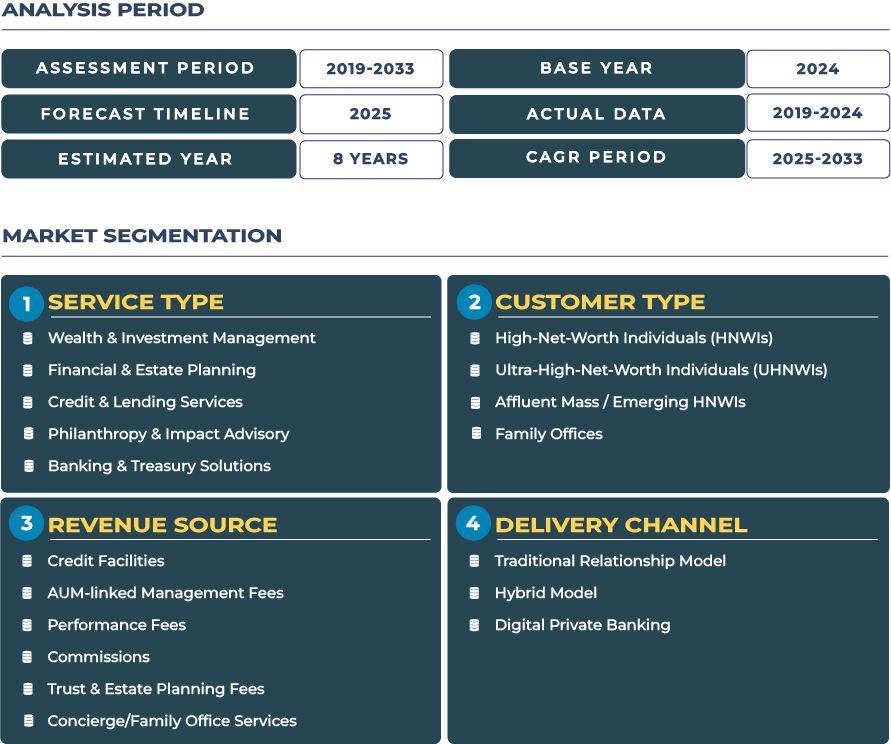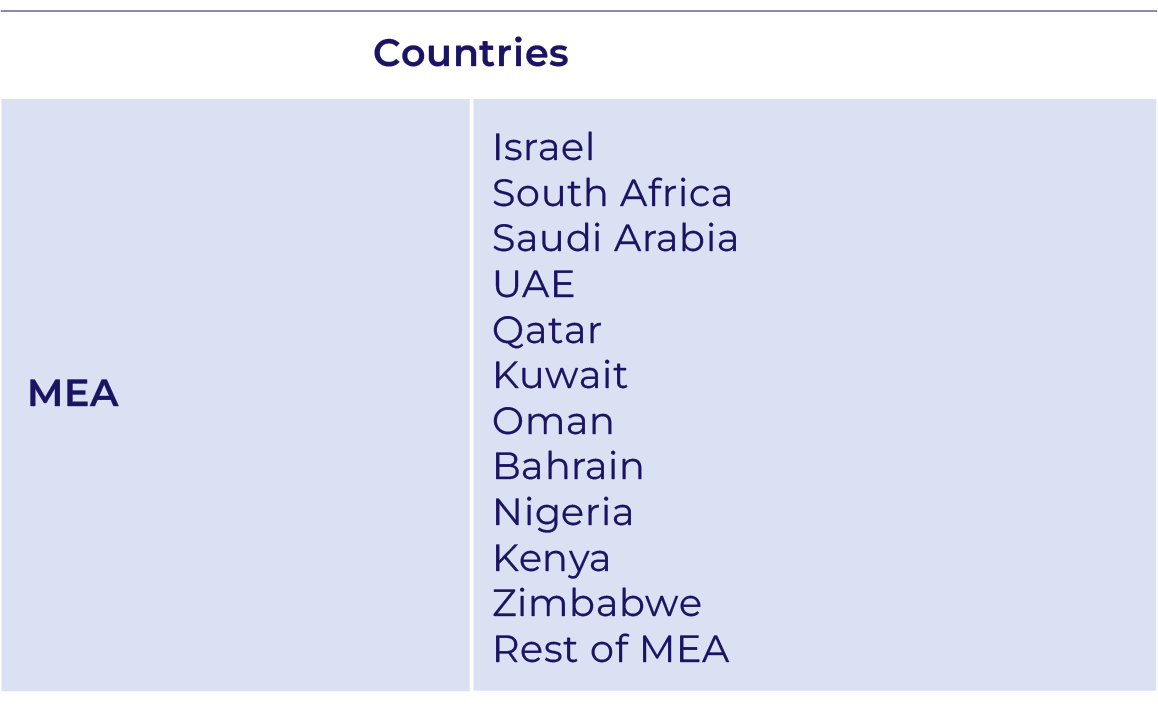Regional Wealth Diversification and Sovereign Transition Reshape the MEA Private Banking Landscape
The Middle East and Africa (MEA) private banking market is entering a transformative decade, driven by sovereign-wealth diversification and institutional investment evolution. Once heavily dependent on hydrocarbon wealth, MEA economies are now redefining their private banking ecosystems through strategic national investment vehicles, digital financial infrastructure, and sustainable asset classes. As of 2025, the MEA Private Banking Market is valued at USD 61.8 billion and is projected to reach USD 107.5 billion by 2033, expanding at a CAGR of 7.2% from 2025 to 2033, according to DataCube Research. This rapid growth reflects regional efforts to modernize wealth management frameworks and align private capital with long-term national visions such as Saudi Vision 2030 and the UAE Centennial 2071. The convergence of sovereign wealth, family offices, and fintech-led investment services is gradually transforming the private banking sector into a diversified financial ecosystem emphasizing transparency, innovation, and sustainability.
Note:* The market size refers to the total revenue generated by banks through various services.
Market Outlook: Strategic Sovereign Diversification Fuels Private Wealth Expansion
The regional wealth narrative of the MEA is evolving from oil dependency toward diversified sovereign portfolios. The shift is spearheaded by proactive policy reforms, government-driven investment diversification, and emerging private capital participation. In Saudi Arabia, the Public Investment Fund (PIF) has redefined sovereign capital strategy, focusing on global equity investments and domestic industrial diversification. Similarly, the Abu Dhabi Investment Authority (ADIA) continues to lead sustainable and technology-linked investment initiatives. These transformations have strengthened the wealth base across the Gulf, attracting private banks and family offices from Europe and Asia seeking exposure to high-growth regional assets. Beyond oil-rich economies, African nations such as Kenya, South Africa, and Nigeria are advancing their private banking industries through fintech integration, cross-border investment platforms, and diaspora wealth engagement. The market’s expansion is underpinned by liberalized financial reforms, growing high-net-worth individual (HNWI) segments, and increased focus on succession and estate planning.
Key Growth Drivers and Restraints Defining the MEA Private Banking Industry
Driving Forces: Sovereign Wealth Expansion and Economic Diversification Catalyze Growth
One of the strongest growth drivers in the MEA private banking market is the rising deployment of sovereign wealth into diversified asset classes. The Gulf’s sovereign funds are channeling capital into global equities, infrastructure, and green energy investments, thereby strengthening regional liquidity and private banking activity. The UAE, Saudi Arabia, and Qatar have become regional financial hubs offering sophisticated wealth and investment management solutions aligned with sustainability objectives. Moreover, the rising entrepreneurial class in Africa and the Middle East-spanning fintech founders, renewable energy investors, and digital entrepreneurs-is redefining client expectations, prompting private banks to enhance credit, lending, and philanthropy advisory services. This modernization is also supported by initiatives from the Arab Monetary Fund promoting cross-border financial stability and monetary integration, encouraging regional financial institutions to expand beyond traditional wealth products.
Restraints: Geopolitical Instability and Regulatory Fragmentation Challenge Market Scalability
Despite the strong fundamentals, geopolitical tensions and uneven regulatory frameworks continue to limit the pace of private banking expansion. The region’s political volatility-especially in North Africa and parts of the Middle East-has affected investor confidence and restricted long-term portfolio allocations. Additionally, regulatory inconsistency across jurisdictions remains a critical challenge for multinational private banks. For instance, while the Gulf Cooperation Council (GCC) countries are advancing toward harmonized banking regulations, sub-Saharan African markets still face policy opacity and compliance complexity. Currency fluctuations and inflationary pressures, particularly in economies like Egypt and Nigeria, further complicate wealth preservation and asset allocation strategies. Hence, while MEA’s potential for wealth expansion remains vast, sustainable growth will depend on governance transparency, macroeconomic stability, and cross-border regulatory coordination.
Emerging Trends and Strategic Opportunities Across the MEA Private Banking Landscape
Trend: Digital Wealth Acceleration and ESG Sukuk Drive Modernization
Digital transformation is reshaping the private banking landscape, with institutions integrating advanced platforms for client engagement, digital onboarding, and automated portfolio management. The rise of digital private banks in Dubai, Riyadh, and Johannesburg reflects the region’s commitment to enhancing accessibility and transparency. In parallel, the emergence of ESG-compliant sukuk (Islamic bonds) has introduced a sustainable financing channel linking religious ethics with global ESG standards. These instruments are attracting institutional investors and private clients alike, aligning wealth with environmental and social impact objectives. This trend underscores a broader regional pivot toward purpose-driven investing, supported by government sustainability mandates and the growing influence of younger, tech-savvy investors.
Opportunities: Regional Wealth Platforms and Green Sukuk Funds Lead New Frontiers
The MEA private banking industry is poised for significant opportunities through regional collaboration and green finance initiatives. Countries such as the UAE, Bahrain, and South Africa are establishing integrated private wealth hubs connecting offshore and onshore capital markets. Green sukuk funds and impact investment products are emerging as a strategic focus, offering private clients the ability to align portfolios with national sustainability goals. Additionally, cross-border wealth management platforms are gaining traction, especially between Gulf economies and African financial centers such as Nairobi and Lagos. Family offices are expanding across these corridors, investing in technology startups, healthcare innovation, and renewable infrastructure. As wealth transitions between generations, demand for estate planning, philanthropy, and multi-currency treasury solutions is expected to intensify, supporting the private banking ecosystem’s long-term evolution.
Regional Analysis by Country: Key Developments Shaping the MEA Private Banking Market
- Saudi Arabia: The Kingdom is driving private banking growth through its Public Investment Fund (PIF), expanding global investment portfolios and promoting wealth diversification beyond oil. Vision 2030 reforms are fostering sustainable finance and enhancing domestic wealth management capabilities. Private banks are increasingly catering to entrepreneurial and family-owned conglomerates. The rise in ESG-linked investments positions Saudi Arabia as a core hub for responsible wealth strategies in the region.
- United Arab Emirates (UAE): The UAE continues to dominate the regional private banking sector through innovation and digital transformation. With the Abu Dhabi Global Market (ADGM) and Dubai International Financial Centre (DIFC) strengthening regulatory frameworks, the country attracts global wealth inflows. Wealth managers are expanding ESG advisory and Sharia-compliant portfolios. The combination of political stability, zero income tax, and strategic positioning cements the UAE as a leading financial hub in MEA.
- Qatar: Supported by the Qatar Investment Authority (QIA), the nation’s private banking sector is thriving amid a diversified sovereign wealth agenda. Qatari institutions are focusing on sustainable infrastructure and energy transition funds. High-net-worth individuals are seeking personalized estate planning and cross-border wealth management. The FIFA World Cup legacy has further accelerated infrastructure-led private investment momentum.
- Kuwait: Kuwait private banking industry benefits from the strength of the Kuwait Investment Authority (KIA), one of the oldest sovereign funds globally. Wealth management strategies are shifting toward digital and green asset classes. The country’s regulatory modernization supports cross-border investments across Europe and Asia. Rising intergenerational wealth transfer among family businesses is creating fresh demand for bespoke financial planning.
- Oman: The Sultanate’s diversification agenda under Vision 2040 is encouraging wealth creation through tourism, logistics, and renewable energy. Private banks are emphasizing credit and lending services for high-net-worth entrepreneurs. The Capital Market Authority (CMA) is enhancing governance and investor confidence. Increased collaboration with regional financial hubs supports Oman’s transition toward a digitally enabled private banking model.
- Bahrain: As one of the Gulf’s oldest financial centers, Bahrain continues to foster innovation in Islamic and private banking. Central Bank of Bahrain (CBB) has been instrumental in integrating fintech into wealth management ecosystems. Growing offshore investment activity and digital onboarding are reshaping client experiences. ESG and Sharia-linked instruments are becoming mainstream in private portfolios.
- Israel: Israel private banking market is supported by robust technology innovation and high entrepreneurial wealth concentration. Wealth managers are offering advanced fintech-driven investment solutions. The country’s strong venture capital ecosystem is encouraging private banks to provide liquidity and exit planning services for startup founders. Despite regional geopolitical tensions, its private banking growth remains resilient and globally connected.
- South Africa: South Africa remains the anchor of private banking in sub-Saharan Africa, leveraging its established financial infrastructure. Institutions like Standard Bank and Investec are pioneering digital wealth and ESG-focused services. The South African Reserve Bank (SARB) ensures financial stability amid market volatility. Wealth growth is increasingly driven by renewable energy investment and cross-border diversification.
- Nigeria: Nigeria’s expanding middle and upper-income class is fueling demand for personalized wealth management. Despite inflation and currency pressures, digital private banking adoption is accelerating. Local banks are partnering with fintechs to enhance cross-border remittance and investment services. The Central Bank of Nigeria (CBN) supports initiatives to stabilize the financial environment and promote investment confidence.
- Kenya: Kenya’s private banking market is underpinned by a thriving fintech sector and rising diaspora investments. Nairobi’s positioning as an East African financial hub attracts wealth inflows from across the region. Banks are integrating mobile-based investment tools and ESG portfolios for affluent clients. Ongoing regulatory modernization by the Central Bank of Kenya (CBK) is strengthening institutional transparency and investor trust.
- Zimbabwe: Zimbabwe private banking industry operates within a volatile macroeconomic environment but continues to show resilience through innovation. Private banks are targeting wealth preservation and foreign currency investment products for affluent clients. Regulatory efforts by the Reserve Bank of Zimbabwe (RBZ) are aimed at financial stability. Cross-border investment flows from diaspora communities are increasingly sustaining the private banking sector.
Competitive Landscape: Sovereign-Linked Banks and Global Entrants Shape Regional Dynamics
The MEA private banking landscape is increasingly competitive, marked by the convergence of local sovereign-linked institutions and global wealth management brands. Key players such as Emirates NBD Private Banking, Qatar National Bank, Standard Bank Group, and Investec are expanding their product portfolios to include ESG-focused advisory, cross-border lending, and family-office support. In 2024, Emirates NBD enhanced its digital private banking platform to integrate regional investment access with international market connectivity, positioning itself as a leader in hybrid wealth solutions. Meanwhile, international banks such as HSBC and UBS continue to deepen their Gulf presence by collaborating with sovereign wealth entities and offering specialized services in sustainable finance and legacy planning. This evolving competitive matrix is expected to foster partnerships between traditional banks, fintech firms, and government-backed investment funds, accelerating innovation within the private banking sector.








